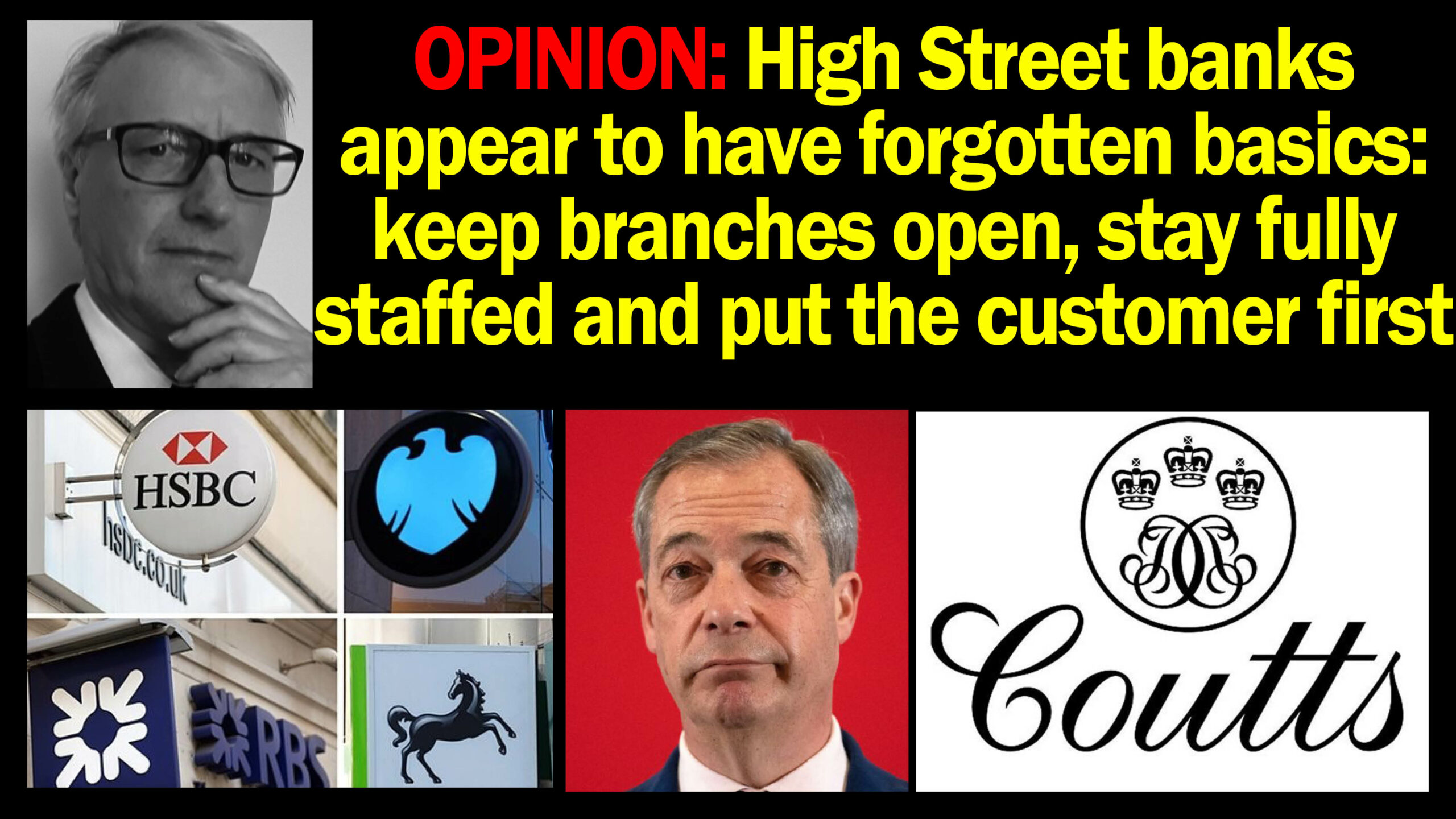By Harry Mottram: At a guess pretty much every business in the UK has had an issue with its bank at some stage. Some have had rather more than an issue and have accused their banks of high handedness in their dealings with them – none more so that the former UKIP leader Nigel Farage whose Coutts bank account was closed due to him being – well Nigel Farage – or so it seems. It’s the reason why there’s a certain degree of customer contempt for banks and dare I say it a certain enjoyment to see them squirm when they have problems. And seeing the highly paid CEO NatWest boss quit over the Farage affair and the knots Coutts and NatWest have tied themselves up in has become a spectator sport. You may disapprove of Farage’s politics (and many do) but surely one politician’s cash is as good as any other – goes the argument. After all fraudster John Stonehouse and conman John Palmer had bank accounts – in fact several bank accounts as did countless other crooks.
Some of the most read stories on the ICSM website are those to do with banks – especially if the banks are in trouble as happened earlier this year when Credit Suisse and two American banks got into difficulties as customers withdrew their cash en masse. Everyone assumes their money is safe in a bank but periodically that proves not to be the case. Back in 2007 and 2008 the banking crisis saw Lehman Brothers in the USA collapse over the sub-prime mortgage scandal and that rare occurrence took place – a run on a bank when Northern Rock teetered on the brink. Banking collapses are nothing new with Birmingham’s Attwood, Spooner and Marshall Bank going bust in 1865 to 1973 and the failure of the London & County Securities bank.
The glory days of the High Street bank came after the war and continued into the 1970s when it was still customary to have an interview with your local bank manager if you wanted a simple request such as an overdraft. Branches proliferated with banks opening throughout the 1950s and 1960s even in the smallest communities. That was to change as the 1970s ended and the ‘loads of money’ culture and mechanisation of processing money took over in the 1980s. By then Building Societies could effectively become banks as competition began the squeeze and banking rules were eased.
The Stock Market Big Bang of the 1980s, the Credit Crunch of 2007, and the rise of digital banking have all led to today’s withdrawal of the Big Four banks from the High Street despite their colossal multi billion pound profits. The Big Four (Nat West, Barclays, HSB and Lloyds) made a collective profit in 2022 of around £20 billion. The reason thousands of High Street branches have closed in the last ten years say the banks is that footfall is down due to online banking. That is true but many small businesses need over the counter transactions from getting change for cash only sales to paying in cheques (yes, some customers still cut cheques) – and there’s an old fashioned but highly important aspect of business of having a good personal relationship with a bank manager. It seems banks have forgotten these basics along with another one that has come to ICSM’s attention. As branches close and automation increases banks have been shedding staff meaning they have become inefficient in dealing with complex enquiries.
Paul Carrotte of ICSM’s debt collection wing said when they put in Third Party Debt Order applications to a bank to ensure a debtor has a bank account and have cash available to pay their creditors, a process that did take days now takes months. It means that someone who is refusing to pay their invoices to an ICSM member can start up a new business in the meantime and run up new debts or simply continue in business and seek new unsuspecting suppliers. Staff cuts are the reason for the snail like speed is the opinion of ICSM – the credit intelligence group – whose raison d’être is to help prevent their members suffering bad debts or late payments. It means that dodgy traders who owe money have a wider timeline to continue running up debts which together with the log jam in the courts – again due to staff cuts and a rising work load – they can get away with not paying.
If you decided not to pay your bank loan back, then you can be sure they would be after you night and day. And conversely if you want to put cash into a bank, they would be more than happy to accept it – and reinvest it to make more billions. But it they don’t like you for whatever reason – and being a Russian money launderer appears not to be against their principles if media reports are to believed – then It appears to be one rule for banks when it comes to business and one rule for the customer as (love him or hate him) Nigel Farage found out.
ICSM CREDIT
For information on ICSM visit www.icsmcredit.com or call 0844 854 1850.
ICSM, The Exchange, Express Park, Bristol Road, Bridgwater, Somerset TA6 4RR. Tel: 0844 854 1850. www.icsmcredit.com. Ian.carrotte@icsmcredit.com
For details for the work of the journalist Harry Mottram visit www.harrymottram.co.uk

